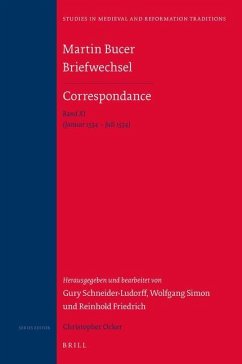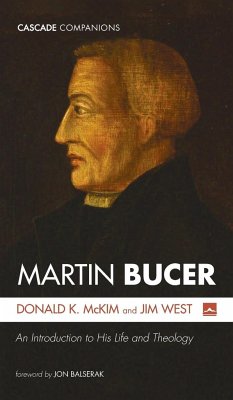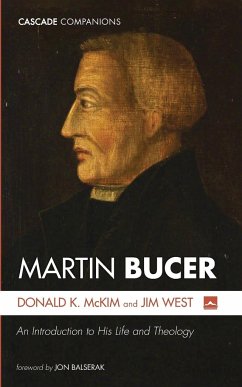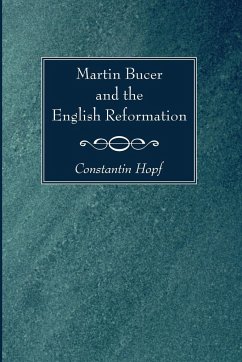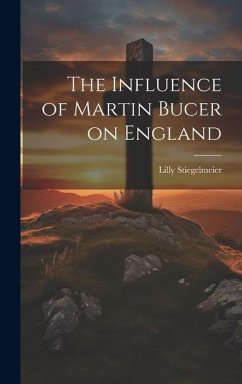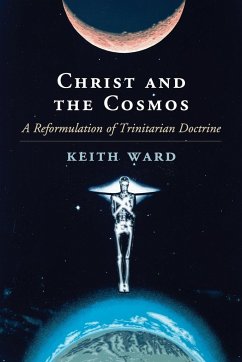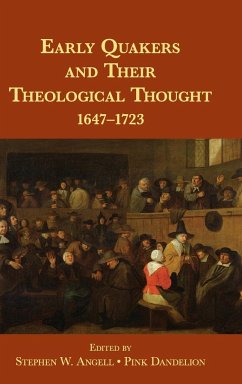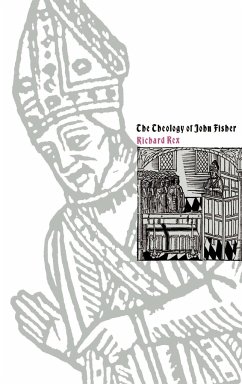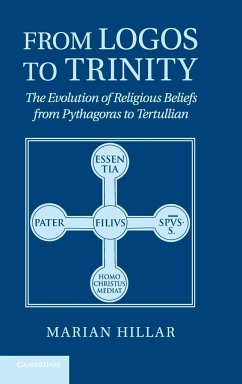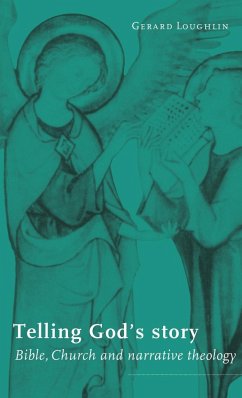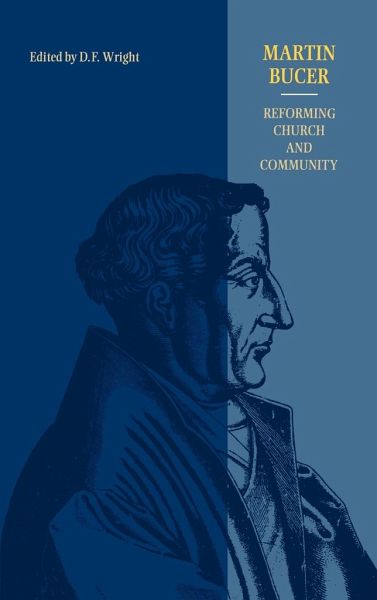
Martin Bucer
Reforming Church and Community
Herausgeber: Wright, D. F.

PAYBACK Punkte
52 °P sammeln!
Martin Bucer (1491-1551) was one of the most important sixteenth-century Reformers, who became leader of the Reformed Churches in Switzerland and South Germany after the death of Zwingli. An international team of specialists on Bucer (several of them involved in the new critical edition of his works) highlight his contribution in thought and practice to building the community of the Church - in Strasbourg, but also elsewhere in Europe, and in England, where he spent the last years of his life in Cambridge. The issues raised emphasise Bucer's distinctiveness, as a Reformer of the Church and its...
Martin Bucer (1491-1551) was one of the most important sixteenth-century Reformers, who became leader of the Reformed Churches in Switzerland and South Germany after the death of Zwingli. An international team of specialists on Bucer (several of them involved in the new critical edition of his works) highlight his contribution in thought and practice to building the community of the Church - in Strasbourg, but also elsewhere in Europe, and in England, where he spent the last years of his life in Cambridge. The issues raised emphasise Bucer's distinctiveness, as a Reformer of the Church and its ordered life, as well as raising matters of contemporary significance, such as Church-state relations, Protestant-Catholic unity, and tensions between a church of true believers and a 'people's' church.
Table of contents:
Preface; Abbreviations; 1. Martin Bucer and the Old Church Peter Matheson; 2. The relation between church and civil community in Bucer's reforming work Martin Greschat; 3. Bucer's influence on Calvin: church and community Willem van't Spijker; 4. The church in Bucer's Commentaries on the Epistle to the Ephesians Peter Stephens; 5. Church, communion and community in Bucer's Commentary on the Gospel of John Irena Backus; 6. Church communion between Christ and believers: impulses and directions in Martin Bucer's Thought Ian Hazlett; 7. Martin Bucer and the Ministry of the Church James Kittelson; 8. Infant baptism and the Christian community in Bucer D. F. Wright; 9. Bucer's ecclesiology in the colloquies with the catholics, 1540-1541 Cornelis Augustijn; 10. The Strasbourg kirchenpfleger and parish discipline Jean Rott; 11. Ecclesiological motives behind the creation of the 'Christlichen Gemeinschaften' Gottfried Hamann; 12. Martin Bucer in England Basil Hall; 13. Martin Bucer and the Englishing of the psalms: pseudonymity in the service of the early English protestant piety Gerald Hobbs; Bibliography; Indexes.
Martin Bucer was one of the most important sixteenth-century Reformers. An international team of specialists here focus on one of his central concerns - building a Christian community to embrace all people but also be utterly spiritual and committed.
A critical assessment of one of the most important Reformers by an international team of specialists.
Table of contents:
Preface; Abbreviations; 1. Martin Bucer and the Old Church Peter Matheson; 2. The relation between church and civil community in Bucer's reforming work Martin Greschat; 3. Bucer's influence on Calvin: church and community Willem van't Spijker; 4. The church in Bucer's Commentaries on the Epistle to the Ephesians Peter Stephens; 5. Church, communion and community in Bucer's Commentary on the Gospel of John Irena Backus; 6. Church communion between Christ and believers: impulses and directions in Martin Bucer's Thought Ian Hazlett; 7. Martin Bucer and the Ministry of the Church James Kittelson; 8. Infant baptism and the Christian community in Bucer D. F. Wright; 9. Bucer's ecclesiology in the colloquies with the catholics, 1540-1541 Cornelis Augustijn; 10. The Strasbourg kirchenpfleger and parish discipline Jean Rott; 11. Ecclesiological motives behind the creation of the 'Christlichen Gemeinschaften' Gottfried Hamann; 12. Martin Bucer in England Basil Hall; 13. Martin Bucer and the Englishing of the psalms: pseudonymity in the service of the early English protestant piety Gerald Hobbs; Bibliography; Indexes.
Martin Bucer was one of the most important sixteenth-century Reformers. An international team of specialists here focus on one of his central concerns - building a Christian community to embrace all people but also be utterly spiritual and committed.
A critical assessment of one of the most important Reformers by an international team of specialists.





